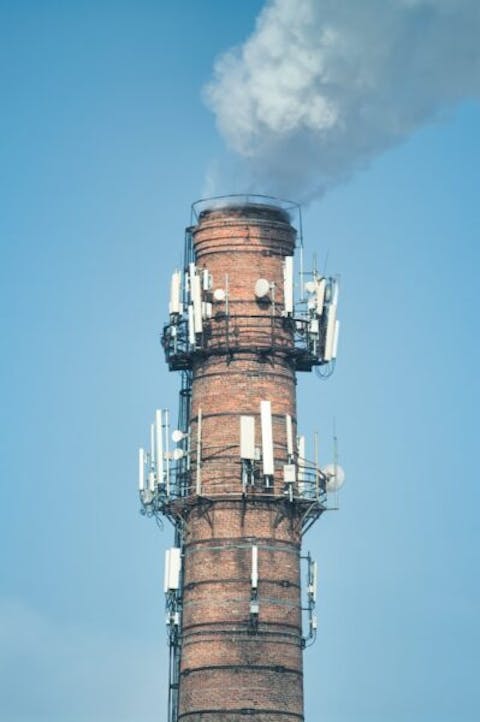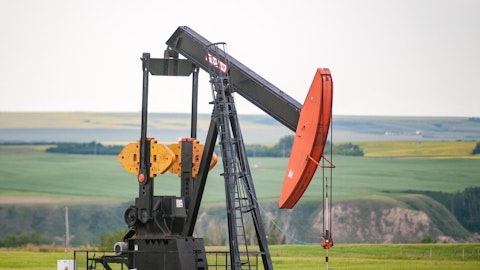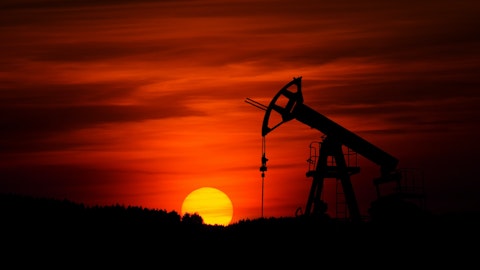Viper Energy Partners LP (NASDAQ:VNOM) Q4 2022 Earnings Call Transcript February 22, 2023
Operator: Good day and thank you for standing by. Welcome to the Viper Energy Partners Fourth Quarter 2022 Earnings Call. At this time, all participants are in listen-only mode. After the speaker presentation, there will be a question-and-answer session. Please be advised that today’s conference is being recorded. I would like to now hand the conference call over to your speaker — one of your speakers today that will be Mr. Adam Lawlis, Vice President of Investor Relations. Adam please go ahead.
Adam Lawlis: Thank you, Shannon. Good morning and welcome to Viper Energy Partners fourth quarter 2022 conference call. During our call today, we will reference an updated investor presentation which can be found on Viper’s website. Representing Viper today are Travis Stice, CEO President. During this conference call, the participants may make certain forward-looking statements relating to the company’s financial conditions, results of operations, plans, objectives, future performance, and businesses. We caution you that actual results could differ materially from those that are indicated in these forward-looking statements due to a variety of factors. Information concerning these factors can be found in the company’s filings with the SEC. In addition, we will make reference to certain non-GAAP measures. The reconciliations with the appropriate GAAP measures can be found in our earnings release issued yesterday afternoon. I’ll now turn the call over to Travis Stice.

Photo by Alex Belogub on Unsplash
Travis Stice: Thank you, Adam. Welcome everyone and thank you for listening to Viper Energy Partners fourth quarter 202 conference call. The fourth quarter topped off a record year for Viper with quarterly ore production setting a company record on both an absolute and per unit basis for the third consecutive quarter. Additionally, as a result of our strong production and continued best-in-class margins, further supported by our disciplined capital allocation approach, we were able to deliver a multiple return of capital and financial initiatives during the quarter. During the fourth quarter, we reduced net debt by $100 million quarter-over-quarter, repurchased roughly 1 million units, and are scheduled to pay distribution that provides a greater than 6% annualized yield.
Looking ahead to 2023, we have initiated average production guidance for the full year that implies 8% year-over-year growth. Importantly, Viper can deliver this growth without spending a single dollar of capital and with most operators in the Permian maintaining roughly flat activity levels. Additionally, this production growth, even as we generated over $100 million in proceeds from non-core asset sales during 2022, including the sale of our Eagle Ford asset, which was producing roughly 250 barrels of oil per day or just over 1% of our current volumes. On the capital return front, Viper continued to execute on our opportunistic unit repurchase program during the fourth quarter, but at a slower pace than during the third quarter. As a result, we are set to pay $0.49 per unit distribution, which is flat quarter-over-quarter despite oil prices being down 10% over the same period.
Our combined base plus variable distribution represents a greater than 6% yield at today’s unit price. In conclusion, the fourth quarter was an outstanding quarter for Viper and the forward outlook continues to improve as our high-quality asset base continues to attract outsized activity levels. Viper remains differentially positioned to grow production without having to spend a single dollar of development of acquisition capital and with only limited operating costs we will be mostly insulated from continued inflationary cost pressures. Given the midpoint of our 2023 production guidance, and assuming $75 WTI, we are expected to deliver almost 10% annualized free cash flow yield. Operator, please open the line for questions.
See also 12 Top Performing Dividend Stocks in January and 12 Top Performing Consumer Staples Stocks in January.
Q&A Session
Follow Vnom Sub Inc. (NASDAQ:VNOM)
Follow Vnom Sub Inc. (NASDAQ:VNOM)
Receive real-time insider trading and news alerts
Operator: Thank you. At this time, we will conduct the question-and-answer session. Our first question comes from the line of Mr. Neal Dingmann with Truist. Neal?
Neal Dingmann: Good morning, guys. Thanks, Travis. My first question just on shareholder distribution specifically, given now the low debt level in your current unit price, do you all think today any differently about unit buybacks going forward than you have in recent quarters. It continues to be a nice mix. I’m just wondering sort of how you think about today about buybacks versus the yield the distribution out there?
Travis Stice: Yes, Neal. Good question, Neal. It really comes down to can we buy minerals in the market cheaper than the combined minerals in the private market where we do deals. And it still seems that buying back units at a price per net-net acre that is competitive with lower-quality assets that are for sale in the basin seems like a good use of capital. We’ve been pretty aggressive since converting our capital return plan to more buybacks particularly in Q3, a little less so in Q4. I think that kind of mimics how we’re thinking about things where on a time period like today, or over the last couple of weeks we’ve got to sell off, and that’s when the buyback kicks in. But fundamentally, we run an NAV at Viper. We also look at what deals are trading for in the market versus what Viper is trading at. And quite frankly, we believe we have a far superior asset base that’s trading lower on a net-net acre basis than some of the stuff we’ve seen trade out in the market.
Neal Dingmann: Yeah. That make sense. And then just a quick follow-up. Just on that small Eagle Ford. I assume, again, just you didn’t see the growth there and you have better, I don’t know maybe call it better prospects for continued growth in the Permian? Is that the sort of rationale €“ and would €“ is there any €“ could we assume any upcoming non-core small Permian sales? I just maybe talk about that a little bit case?
Travis Stice: We’ve sold some non-core Permian assets. It’s usually from an operator that is going to develop those minerals very quickly. So they’re paying a number where it’s higher than our hold case, because they’re €“ if they get the deal, they’re going to develop the asset faster. So that’s kind of what’s happening in the Permian, I would call that, the exception versus the norm. With the Eagle Ford sale, we bought that deal in 2016, 2017 it’s been a good deal for us. Unfortunately, there’s not as much growth there as there was in years past. And we just thought that, that would be a very good use of proceeds to fund Permian acquisitions. And I think generally being able to sell that losing 250 to 300 barrels of oil a day, and still hit numbers in 2023 that we expected prior, just shows that we didn’t need that asset in the portfolio and instead we’re being we’re moving to 100% Permian and higher growth.
As we pointed out in Travis’ prepared remarks, right? This business even the Diamondback or other operators in the basin aren’t growing like they used to. The benefit of the mineral business is it can grow despite the parent company or other companies not growing as much.
Neal Dingmann: Yes, agree. I love the per unit growth obviously with the buybacks and the production growth. Nice job, guys. Thanks.
Travis Stice: Thank you.
Adam Lawlis: Thanks, Neal.
Operator: Our next call comes from the line of Derrick Whitfield with Stifel. Derek, please go ahead with your question.
Derrick Whitfield: Good morning, all. Congrats again on a strong quarter.
Travis Stice: Thank you, Derek.
Derrick Whitfield: With regard to your six months and 2023 guidance the outlook appears to imply a step-up in growth in the second half to about the 22,000 barrel level for oil. Does that generally hit late Q2 early Q3 based on expected Diamondback activity?
Travis D. Stice: Yes. That’s right, Derrick. It’s just a lot of timing on some of these bigger Diamondback pads as they’ve kind of shifted to some of that large-scale development particularly in so and Robertson range where we’ve got a larger NRI on it will vary a little bit quarter-to-quarter as those wells or pass get turned to production. But the way that we’re looking at it right now the first quarter will be kind of flattish to where we were here. And then you’ll see volumes pick up in the second quarter kind of in the higher end of that first half range. But then, yes, your math is right as well that kind of the implied number in the back half of the year will still represent some pretty significant growth in that second quarter. And it’s really just going to be the cadence of the net wells being turned to production. .
Adam Lawlis: I think importantly Derrick you can see these wells coming, right? I mean like the zepco pad, which is going to be one of the larger pad in Robertson range coming on here midyear. So it’s not a growth on the comp. We know that that growth is coming and you can visibly see it hitting the business in Q2 and Q3.
Derrick Whitfield: Great. Makes sense. And perhaps more long-term in nature. I wanted to ask how you guys are thinking about the opportunity in your exposure resulting from the deeper Wolfcamp D Barnett and Woodford delineation test the industry is pursuing across the Midland Basin?
Travis Stice: Yes. I think that is one of the greatest benefits of the mineral business is that — we underwrite minerals based on what we know. And over the course of time particularly in the Permian you’ve seen more zones become economic. You’ve seen better recoveries. You’ve seen large multi-pad development. And a lot of that was not underwritten five, six, seven years ago. So you one look minerals versus — you own those minerals forever in perpetuity. And that creates opportunities like some of these deeper rights in places like Spanish Trail in the western side of the basin which is starting to get a lot of attention as it relates to deeper development. So more to come. We haven’t signed a lot of leases yet in those deep zones, but you can bet that that’s going to be a benefit to Viper and tangentially down and back.
Derrick Whitfield: Great. Thanks for your time.
Travis Stice: Thank you, Derrick.
Operator: Our next call is coming from the line of Paul Diamond with Citi. Please standby.
Paul Diamond: Hi, good morning. Just a quick follow-up here. Looking more to the macro, I know you guys have talked about the bid-ask being a bit wide for your taste in prior quarters. Have you seen any movement on that in the direction as far as you guys are looking at potential whether it’s bolt-on or larger M&A?
Travis Stice: Good question, Paul. I would say versus E&P land, the bid-ask is still pretty wide in minerals. Minerals is unique because a lot of these mineral owners, they don’t pay any CapEx. They don’t see the impacts of inflation on their cost structure or their checks. All they see is the months they received in July and August of last year when oil was $100 a barrel. So that’s their new baseline. And that results in a wider bid-ask spread today with crude at 75% than summer last year over $100. So it’s a little different in mineral land. I would say the bid-ask is still pretty wide. Obviously under Diamondback we can still — we still have differential information on timing so that we can pay more from a value perspective, because we know exactly when those minerals are going to get developed. But we’ll see how it unfolds throughout the year, but right now it’s pretty wide.
Paul Diamond: Understood. Thank you. And just a quick follow-up, kind of, like shifting from Diamondback acreage more to the third-party. As far as like operational cadence, is there anything you guys have seen in the last quarter or so that surprised you as far as the operations cadence or just how they’re thinking about the medium to longer term?
Adam Lawlis: No not really Paul. I would say gross activity levels have been pretty steady. When you look at the rig count, you look at wells being spud or permits being filed across the position I think really gross exit levels have been pretty steady for the past six to nine months. When we look forward to 2023 though, we’re going to get some benefit on the third-party side of some of our higher NRI stuff being developed. So here today in February, it’s kind of the hardest guidance we have to do for the full year and making some assumptions on what Q4 of 2023 might look like. But right now today, we’ve got pretty much the same visibility to total net wells being turned to production this year as we did all of last year. So that’s pretty encouraging for us when we look at third-party activity levels and I think that could continue to improve as we progress through the year.
Paul Diamond: Understood. Thanks for your time.
Adam Lawlis: Thanks Paul.
Operator: At this time, I would like to now turn the call back over to Mr. Travis Stice, CEO.
Travis Stice: Thank you again to everyone for participating in today’s call. If you’ve got any questions, please reach out to us using the contact information provided. Thank you.
Operator: Thank you for your participation in today’s call. This does conclude the program. You may now disconnect.
Follow Vnom Sub Inc. (NASDAQ:VNOM)
Follow Vnom Sub Inc. (NASDAQ:VNOM)
Receive real-time insider trading and news alerts





